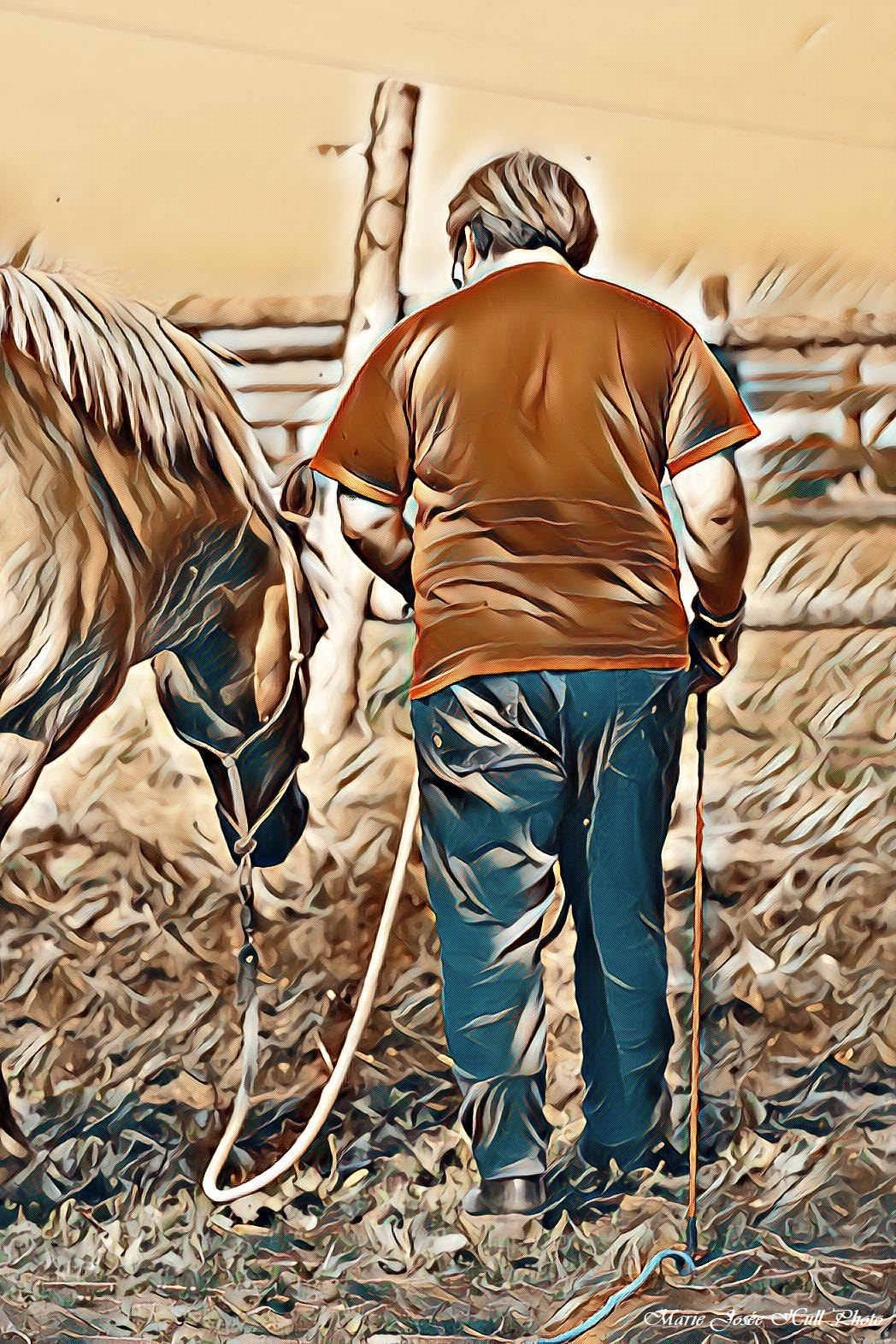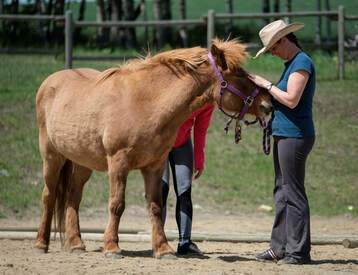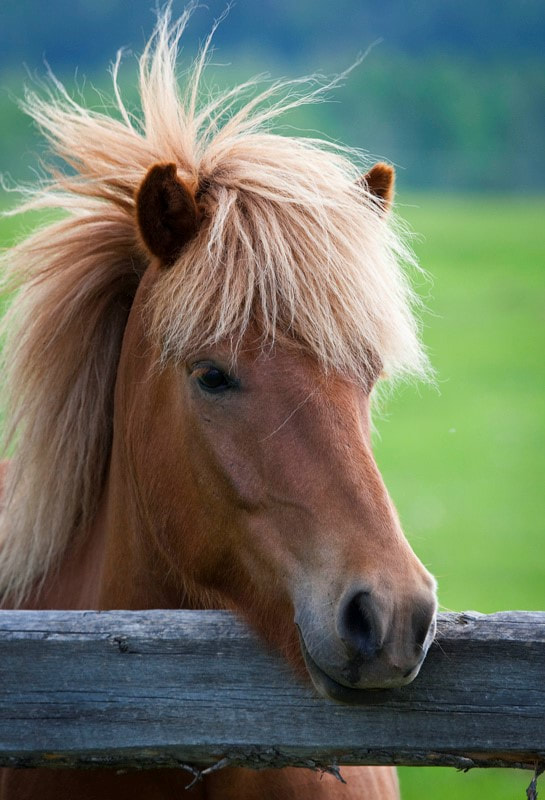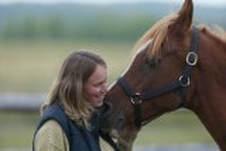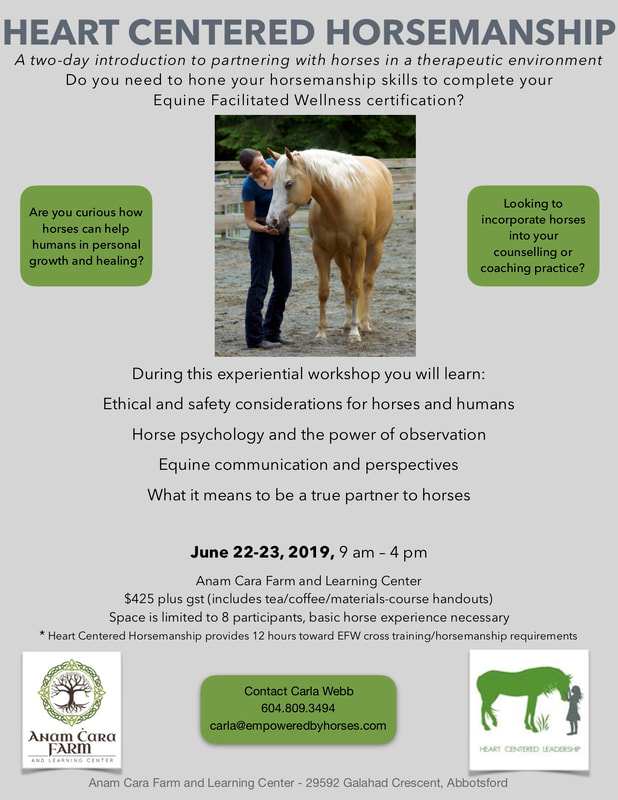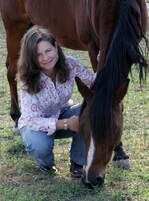FRANÇAIS
IN THIS APRIL 2019 ISSUE OF OUR EFW-CAN NEWSLETTER WE HAVE:
|
Q5: WHO SHOULD I CERTIFY WITH IN EQUINE THERAPY?
BY SUE MCINTOSH
THE QUICK ANSWER
There are many certification options in the Animal Assisted Therapy (AAT) and Equine Facilitated Wellness (EFW) fields, meaning this can be an overwhelming and confusing topic at first. For reasons I discuss in more depth below, the Canadian certification program I usually recommend for EFW is through Equine Facilitated Wellness – Canada (EFW-Can).
|
EFW-Can have a credible and flexible certification approach for people who are seeking certification in EFW as a mental health, equine facilitated learning and/ or equine professional. It is possible to certify in one, two or all three of these areas.
AAT training is a whole other area which will need to be the subject of another article, but two organisations I regularly recommend are Pet Partners and Dreamcatcher Nature Assisted Therapy.
AAT training is a whole other area which will need to be the subject of another article, but two organisations I regularly recommend are Pet Partners and Dreamcatcher Nature Assisted Therapy.
THE LONGER ANSWER
This is a lengthy topic with several professional associations, and an increasing number of private businesses, offering certification programs. Some of these programs also offer initial and ongoing training that they require you to attend in order to attain and then maintain their certification, others programs are independent of those delivering the training. Each program come with different requirements in terms of both pre-existing credentials, training and other requirements including practicums, personal growth, mentoring, and continuing education, and lead to different types of certification.
Our aim at Healing Hooves is to help each individual find the certification and training route which fits best for them and their situation. This is usually most effective as a conversation which takes into consideration both the person’s individual goals in EFW and pre-existing credentials and experience. For the purposes of this article I will stick to some guiding principles and highlight some of the key options available. We provide and explore more in depth details of several options, and help people apply these to their personal goals and situations, within our Exploration Training program.
Our aim at Healing Hooves is to help each individual find the certification and training route which fits best for them and their situation. This is usually most effective as a conversation which takes into consideration both the person’s individual goals in EFW and pre-existing credentials and experience. For the purposes of this article I will stick to some guiding principles and highlight some of the key options available. We provide and explore more in depth details of several options, and help people apply these to their personal goals and situations, within our Exploration Training program.
|
CONSIDERATIONS IN SELECTING A CERTIFICATION PROGRAM
|
|
Firstly, I believe that an EFW or AAT certification program should speak to and assess your training, skills and credentials in all of the following areas:
|
Secondly, I believe that an EFW or AAT certification program needs to have a strong focus on safety and ethics.
This is complex within both EFW and AAT as there are many different needs to consider, including those of the clients, the horses and the facilitators, which can at times seem to conflict. There are also several different aspects of safety, for example emotional safety as well as physical, which apply. The flexibility and variety within the fields of EFW and AAT also create different considerations and risk factors. Thus a certification program needs to find a way to be comprehensive enough in all of the above areas to be credible, yet at the same time flexible enough to be practical.
Finally, I believe that credible and effective certification in any area is best achieved by an organization that is not also in the business of providing the required training.
This removes the conflicting interests (actual and perceived) of personal gain and ensures that the focus is upon developing standards and certifying professionals that will best serve the needs and protect the interests of our clients and of our horses. This also follows International and Canadian best standards that call for the clear separation of certification and training as detailed in ISO/IEC 17024, Conformity assessment – General Requirements for bodies operating certification of persons. The only programs I am aware of following these requirements are EFW Canada in Canada, and PATH and the CBEIP in the US.
The certification program that I have found does all of the above the best in Canada for EFW, and thus recommend for most people, is from Equine Facilitated Wellness-Canada.
That being said, I feel it important to provide information about the other options, to empower people to assess for themselves, which is the best option for them, and for the situations when EFW Canada may not be the best option.
An example of this may be if you plan to work within a Therapeutic Riding program (usually as a partnership between a mental health professional and a Therapeutic Riding instructor) in which case the CanTRA program may be the better fit for you. CanTRA utilises a US exam based program from the Certification Board for Equine Interaction Professionals (CBEIP) and certify you for working with one client and one horse at a time.
Other options for certification include PATH International, EAGALA and Epona.
This is complex within both EFW and AAT as there are many different needs to consider, including those of the clients, the horses and the facilitators, which can at times seem to conflict. There are also several different aspects of safety, for example emotional safety as well as physical, which apply. The flexibility and variety within the fields of EFW and AAT also create different considerations and risk factors. Thus a certification program needs to find a way to be comprehensive enough in all of the above areas to be credible, yet at the same time flexible enough to be practical.
Finally, I believe that credible and effective certification in any area is best achieved by an organization that is not also in the business of providing the required training.
This removes the conflicting interests (actual and perceived) of personal gain and ensures that the focus is upon developing standards and certifying professionals that will best serve the needs and protect the interests of our clients and of our horses. This also follows International and Canadian best standards that call for the clear separation of certification and training as detailed in ISO/IEC 17024, Conformity assessment – General Requirements for bodies operating certification of persons. The only programs I am aware of following these requirements are EFW Canada in Canada, and PATH and the CBEIP in the US.
The certification program that I have found does all of the above the best in Canada for EFW, and thus recommend for most people, is from Equine Facilitated Wellness-Canada.
That being said, I feel it important to provide information about the other options, to empower people to assess for themselves, which is the best option for them, and for the situations when EFW Canada may not be the best option.
An example of this may be if you plan to work within a Therapeutic Riding program (usually as a partnership between a mental health professional and a Therapeutic Riding instructor) in which case the CanTRA program may be the better fit for you. CanTRA utilises a US exam based program from the Certification Board for Equine Interaction Professionals (CBEIP) and certify you for working with one client and one horse at a time.
Other options for certification include PATH International, EAGALA and Epona.
IF YOU FOUND THIS ARTICLE HELPFUL, PLEASE SHARE IT!
|
Sue McIntosh is the founder of Healing Hooves in Cremona, Alberta. She offers services in Equine and Animal Assisted Therapy, counselling, parent support, professional training and resources in Equine Facilitated Wellness (EFW), child development and attachment, to adults, children families and professionals since 1999. We are proud to have her as a tri-certified EFW-Can trainer, mentor and practitioner.
|
Barn Wisdom 101: Have the Right Tools
By Sara Willerson
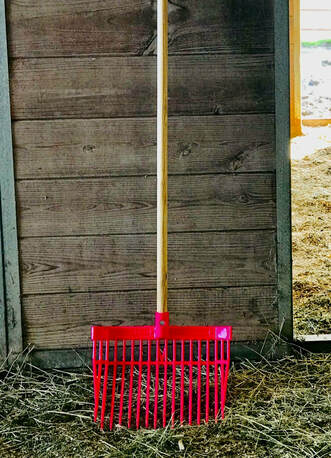
For Valentine’s Day this year, my partner got me a new manure fork. And to add a little holiday flair, it’s bright pink! I love it! Each morning I walk in the barn, it brings a smile to my face. This was the perfect gift for me as my old one had a few broken teeth and had pretty much come to the end of its life.
For me, cleaning stalls is one of my favorite sources of personal therapy. It is better than mowing the lawn or dragging the arena. As I am picking up all the poo, clearing out the debris and smoothing the horses’ bedding into a fresh, cozy resting space, I experience major peace and satisfaction. It truly is a moving meditation practice.
As I am clearing out the old and the physically discarded, I find myself in the same process with my self. Completing old thoughts. Working through interactions and events that I have been chewing on for awhile. And I even experience huge ah-ha’s of new ideas and clarity on next steps forward – both personally and professionally.
I was making do with the old tool. I was doing double time when it came to picking out the manure piles and had to go back over each stall several times due to the missing tines. This was time consuming and used a whole lot of extra energy. I found myself getting frustrated and slightly grumpy. This old way wasn’t working so well anymore.
Besides being super cute and a fun color, my new tool is stream lining my process. It is the perfect size and weight for me. It doesn’t cause stress/strain on my arms. I clean out the old and bring in the new shavings. Each stall is bright, clean, smelling good and ready for its owner in no time.
So, I got to thinking…What a wonderful metaphor to use in life! How often do we keep using the same outdated tools to support ourselves? Is there resistance to finding a new tool, a new process, a new way to achieve a goal? What is that about when it presents? This simple, super cute tool has had a major impact on my life.
What about you? Are there some tools in your personal box that are ready to be retired or recycled? Are you ready to learn some updated practices that are aligned with who you are today?
Bring on the manure! My hot pink fork and I are READY!
For me, cleaning stalls is one of my favorite sources of personal therapy. It is better than mowing the lawn or dragging the arena. As I am picking up all the poo, clearing out the debris and smoothing the horses’ bedding into a fresh, cozy resting space, I experience major peace and satisfaction. It truly is a moving meditation practice.
As I am clearing out the old and the physically discarded, I find myself in the same process with my self. Completing old thoughts. Working through interactions and events that I have been chewing on for awhile. And I even experience huge ah-ha’s of new ideas and clarity on next steps forward – both personally and professionally.
I was making do with the old tool. I was doing double time when it came to picking out the manure piles and had to go back over each stall several times due to the missing tines. This was time consuming and used a whole lot of extra energy. I found myself getting frustrated and slightly grumpy. This old way wasn’t working so well anymore.
Besides being super cute and a fun color, my new tool is stream lining my process. It is the perfect size and weight for me. It doesn’t cause stress/strain on my arms. I clean out the old and bring in the new shavings. Each stall is bright, clean, smelling good and ready for its owner in no time.
So, I got to thinking…What a wonderful metaphor to use in life! How often do we keep using the same outdated tools to support ourselves? Is there resistance to finding a new tool, a new process, a new way to achieve a goal? What is that about when it presents? This simple, super cute tool has had a major impact on my life.
What about you? Are there some tools in your personal box that are ready to be retired or recycled? Are you ready to learn some updated practices that are aligned with who you are today?
Bring on the manure! My hot pink fork and I are READY!
|
Sara B. Willerson, LCSW and the Horses, Heart & Soul ® herd provide Equine Facilitated Psychotherapy and Life Coaching services for children and adults in North Texas. She is a graduate of Smith College School for Social Work and an Eponaquest Advanced Approved Instructor. Together with her equine partners, Sara invites everyone to experience the transformational healing power of the horse outside of the traditional office environment. For more information please visit www.horsesheartandsoul.com .
|

